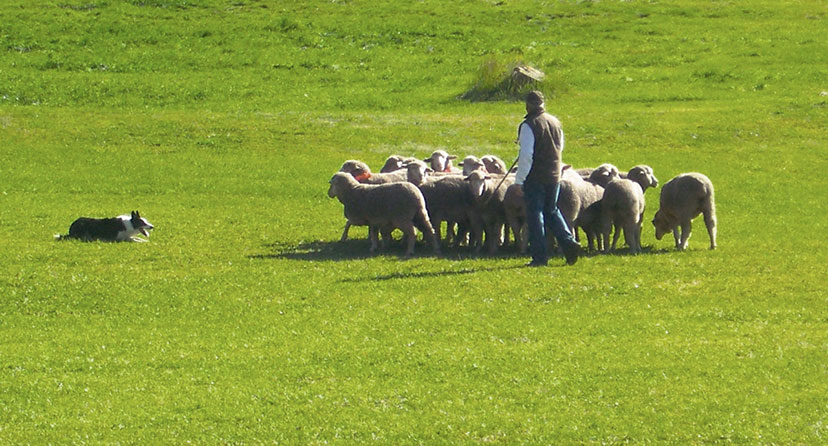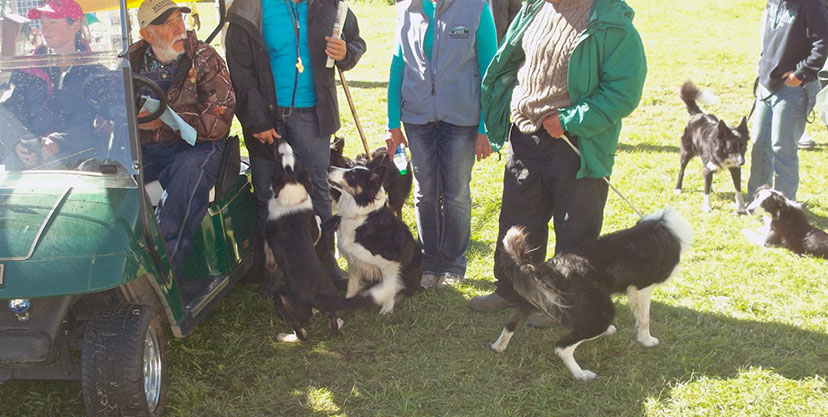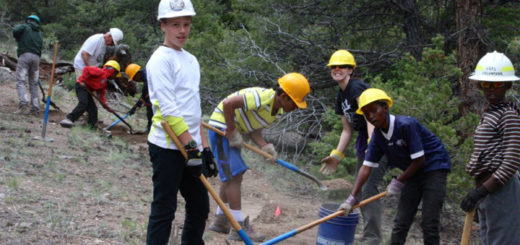PHOTO ESSAY: Meeker Classic is Classic Border Collie
The bumper sticker on a pick-up truck in the parking lot said, “If you don’t have a border collie, you just have a dog”.
After attending my first sheepdog trial — the Meeker Classic Sheepdog Championship Trials — last weekend in Meeker, Colorado, I have to say I agree. And if you are a dog lover, I promise that you would enjoy the Meeker finals as well.
My friend Janet invited me to go with her, and, although I knew absolutely nothing about sheepherding dog competition, I thought it would be a fun adventure. We left Saturday and had a very pleasant, and pleasantly beautiful, drive to Rifle. Highway 70 through Glenwood Canyon is breathtaking. Our one faux pas was exiting at the Shoshone rest stop for lunch. It was anything but restful, as it was situated under the freeway and was a put-in for rafters and heavily traveled by bicylists on a bike path.
I guess when you live in Denver, recreating under a freeway in Glenwood Canyon is getting away from it all. Not so much for us who live in Salida.
So we got back on Highway 70 and tried the No Name (pronounced “No-Nahmey”) rest stop exit. This spot was far enough from the highway to offer a serene and scenic space to picnic with a view of the river.
We spent the night in Rifle, since Meeker lodging was booked months in advance for the Meeker Classic. Sunday morning we drove the 41 miles to Meeker, and parked ourselves in the grandstand to watch 12 dogs compete in the championship trial finals.
The dogs are sent 500 yards to fetch open-range sheep brought down from the Meeker hills just for the event. They are feisty and used to fending off predators. The object of the competition is to test the working dog’s ability to manage and maneuver the sheep in a calm, controlled manner through a long and gated course, separate out marked sheep, and finish with penning those sheep close in to the spectators. Sheep want to flock and not be separated from each other, which makes the border collie’s job that much more difficult.
Photos do not do this event justice. The intelligence, athleticism, and work ethic of each of the 12 border collies, as they worked with their human handlers, and maneuvered as many as 20 sheep through gates, and eventually separated 5 marked sheep into a small pen, was nothing short of spectacular.
As the day unfolded, I learned about the rules of the competition from the beautiful program I purchased, and from the announcer’s narrative. The crowd was very polite, much like a golf tournament, so as not to distract the working dogs. But when each dog successfully completed a component of their course, the crowd clapped briefly, just as when a pro golfer makes a successful shot.
I was so enamoured with the Meeker Classic Sheepdog Championship Trials, that I purchased the documentary “Away to Me” from director and filmmaker Andrew Hadra, who had set up a booth at Meeker to promote his film. “Away to Me” takes the audience on a visually spectacular journey across the world to follow three national champions as they prepare for and then compete in the Soldier Hollow Classic Championship, one of the world’s premier trials.
I learned from the film that the Soldier Hollow finals are not as difficult as the Meeker finals I was witnessing. Meeker uses 20 sheep for each dog, and the dogs are sent out 500 yards to find each of the two groups of ten sheep, compared to Soldier Hollow that uses a total of 16 sheep and a 400 yard course. And Meeker dog competitors must select five out of five collared (marked) sheep to pen, whereas Soldier Hollow competitors select five out of eight collared sheep to pen.
The DVD also included extras, such as ‘Young Dog Training’, in which Amanda Milliken, 4-time Canadian National Sheepdog Champion, demonstrates how she and many other handlers begin to train their young herding dogs on sheep.
Amanda explained how the border collies that compete at the trials are bred working dog to working dog, and are genetically predisposed to want to work at herding.
“You can try to train your Lab to herd, but you won’t get far.”
Someone asked Amanda the question, “What do you do to reward your dog?”… because we never saw the dogs receive treats at the end of their runs.
“You reward them with more work,” she replied.
Now that’s a thought to contemplate in today’s human world.






